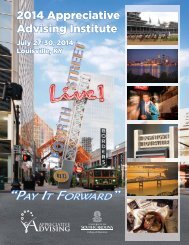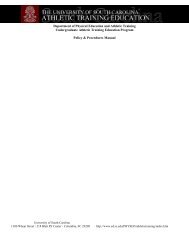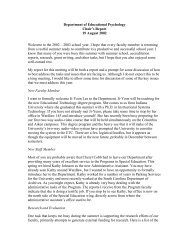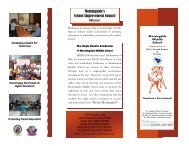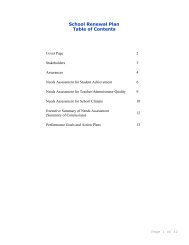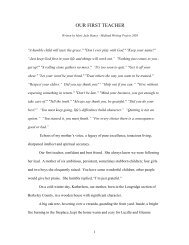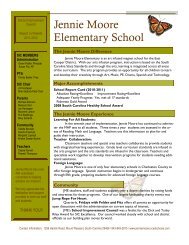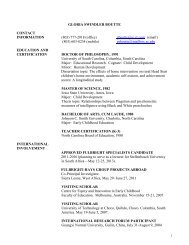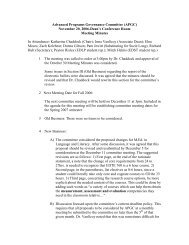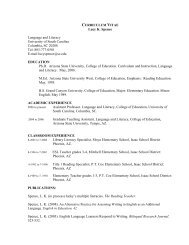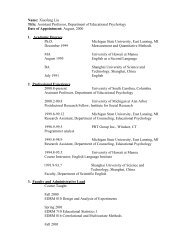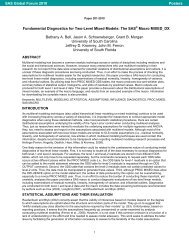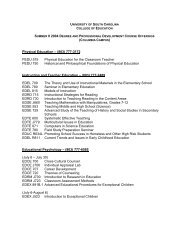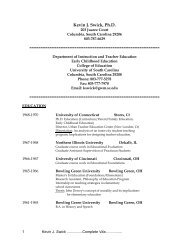EDLP 725 Syll Spring 2003-Mons - College of Education - University ...
EDLP 725 Syll Spring 2003-Mons - College of Education - University ...
EDLP 725 Syll Spring 2003-Mons - College of Education - University ...
Create successful ePaper yourself
Turn your PDF publications into a flip-book with our unique Google optimized e-Paper software.
<strong>EDLP</strong> <strong>725</strong><br />
Principles <strong>of</strong> Curriculum Construction<br />
<strong>University</strong> <strong>of</strong> South Carolina<br />
Department <strong>of</strong> <strong>Education</strong>al Leadership & Policies<br />
Pr<strong>of</strong>essor: Susan L. Schramm-Pate, Ph.D.<br />
Term: <strong>2003</strong> <strong>Spring</strong><br />
Time/Location Museum <strong>of</strong> <strong>Education</strong>, Wardlaw Mondays 4:30-7:15<br />
Office: Room 317 Wardlaw <strong>College</strong> <strong>of</strong> <strong>Education</strong><br />
Office Hours: By appointment<br />
Office Phone: 803.777.3087<br />
Email: sschramm@gwm.sc.edu<br />
Required Course Readings:<br />
• Oliva, P. (2001). Developing the Curriculum (5 th Edition). New York: Longman<br />
• Ornstein, A., Behar-Horenstein, L., and Pajak, E. (<strong>2003</strong>). Contemporary Issues in<br />
Curriculum. Boston: Allyn and Bacon<br />
• Schramm, S. L. (2002). Transforming the Curriculum: Thinking Outside the Box.<br />
Lanham, MD: The Scarecrow Press, Inc.<br />
Optional but recommended:<br />
• Publication Manual <strong>of</strong> the American Psychological Association (2001). Washington,<br />
DC: American Psychological Association, 5 th edition<br />
•<br />
I. COURSE GOALS AND OBJECTIVES<br />
The purpose <strong>of</strong> this course is to enable the learner to explore some the methods and<br />
procedures to design, develop, implement, and evaluate curricula.<br />
Upon completion <strong>of</strong> <strong>EDLP</strong> <strong>725</strong> the learners should be able to:<br />
• Know various historical curricular theories and theorists which have impacted<br />
curriculum development, implementation, and evaluation in the United States;<br />
• Use APA style manual for citations and references in scholarly writing;<br />
• Analyze methods and procedures to design, implement, and evaluate curricula;<br />
• Develop a platform <strong>of</strong> beliefs about teaching, inclusion, and curriculum development;<br />
• Demonstrate skills and knowledge necessary for developing an integrated curricular<br />
unit; and<br />
• Understand frameworks for enhancing awareness <strong>of</strong> and action in curricular<br />
leadership roles (i.e., decision-maker, curriculum-creator, inquirer, community<br />
member/builder, and democratic citizen and leader).
<strong>EDLP</strong> <strong>725</strong> Principles <strong>of</strong> Curriculum Construction-Schramm-Pate—<strong>Spring</strong> <strong>2003</strong><br />
II. COURSE REQUIREMENTS & EVALUATION<br />
Grades on papers, presentations, and discussions will depend on several factors:<br />
• Discussion and Participation:<br />
In this course learners are responsible for reacting to and forming ideas based<br />
upon course concepts, readings, and discussions. Come to class having done the<br />
reading. Participate and contribute to any group projects. Turn in all assignments.<br />
Engage and promote class discussions every class period.<br />
• Attention to APA Manual Guidelines<br />
• Sensitivity to Labels<br />
Respect people’s preferences; call people what they prefer to be called. For<br />
example, instead <strong>of</strong> describing participants as Asian Americans or Hispanic<br />
Americans, it may be helpful to describe then by their nation or region <strong>of</strong><br />
origin (e.g., Chinese Americans, Mexican Americans, Cuban Americans).<br />
Racial and ethnic groups are designated by proper nouns and are capitalized<br />
(e.g., Black, White, Asian). If you are discussing sexual orientation, the<br />
terms, gay men and lesbians are preferred. Also, sexual orientation is the<br />
preferred term. Disability: Use disability to refer to an attribute <strong>of</strong> a person<br />
and handicap to refer to the source <strong>of</strong> limitations (e.g., steps and curbs<br />
handicap people who require the use <strong>of</strong> a ramp). As a general rule, “person<br />
with ______,” person living with _________,” and person who has<br />
________” are neutral and preferred forms <strong>of</strong> description. Age: Avoid open<br />
ended definitions such as “over 65” (instead say “ages 65-85”). Avoid the<br />
term, elderly (older person is preferred). Boy and girl are correct terms<br />
referring to people <strong>of</strong> high school age and younger; young man and young<br />
woman and male adolescent and female adolescent are appropriate; for<br />
persons 18 and older (<strong>of</strong> college age and older), use men and women.<br />
• Sensitivity to Gender Bias<br />
Gender is cultural and is the term to use when referring to men and women as<br />
social groups. Sex is biological; use it when the biological distinction is<br />
predominant. Also, using man to refer to human beings is not as accurate as<br />
the phrase men and women.<br />
• Coherent and Readable Text<br />
Write in clear and vigorous prose. Make each sentence maximally<br />
informative, especially the lead sentences. Use active rather than the passive<br />
voice (e.g., passive =The survey was designed by Simpson (2000); and active<br />
= Simpson (2000) designed the survey.). Use the third person rather than the<br />
first person. Avoid colloquial expressions (e.g., write up for report), jargon<br />
(e.g., monetarily felt scarcity for poverty), wordiness (i.e., say only what needs<br />
to be said), and redundancy (e.g., They were both alike)<br />
• Substance:<br />
Classroom and written work are expected to reflect substance in thought<br />
appropriate for graduate students<br />
2
<strong>EDLP</strong> <strong>725</strong> Principles <strong>of</strong> Curriculum Construction-Schramm-Pate—<strong>Spring</strong> <strong>2003</strong><br />
• Promptness:<br />
Written work (typed) is expected to be submitted at the beginning <strong>of</strong> the class<br />
period <strong>of</strong> the assigned day; five (5) points will be deducted for each day an<br />
assignment is late. Except with prior approval or under exceptional<br />
circumstances, late papers will not be accepted. Papers more than two weeks late<br />
will not be accepted.<br />
• Neatness:<br />
Written work should be typed, free <strong>of</strong> errors, and should follow the Publication<br />
Manual <strong>of</strong> the American Psychological Association (2001 5th Edition).<br />
• Preparation:<br />
Substantive class participation is expected during each class meeting. The student<br />
is responsible for obtaining information and materials missed because <strong>of</strong> her or<br />
his absence.<br />
• Attendance:<br />
Attendance is required at every class meeting. Learners are expected to attend<br />
each class meeting and to be prepared for each day’s activities, and especially to<br />
discuss readings due on due dates.<br />
• Performance:<br />
Student work will be evaluated on the criteria stated in this syllabus and with<br />
reference to the performance <strong>of</strong> other students in the course.<br />
• Grading Scale:<br />
A 94-above Exceptional<br />
B+ 90-93 Very Good<br />
B 85-89 Good<br />
C+ 83-84 Satisfactory<br />
C 75-82 Marginally acceptable<br />
III. COURSE ASSIGNMENTS<br />
A. <strong>Education</strong>al Philosophy Comparison Paper 20%<br />
B. Integrated Curriculum Group Project 40%<br />
C. Platform Statement 20%<br />
D. Discussion/Participation/Attendance in Integrated Curriculum Groups 20%<br />
ASSIGNMENT DESCRIPTIONS:<br />
All papers, unless otherwise noted, should be typed, double spaced, 12 point font with 1”<br />
margins, with citations and reference pages in accordance with the Publication Manual <strong>of</strong><br />
the American Psychological Association (2001, 5 th Edition).<br />
3
<strong>EDLP</strong> <strong>725</strong> Principles <strong>of</strong> Curriculum Construction-Schramm-Pate—<strong>Spring</strong> <strong>2003</strong><br />
A. <strong>Education</strong>al Philosophy Comparison Paper (20%)<br />
Due: February 17<br />
Search the literature and prepare a 4-5 page (double spaced, 12 point Times New Roman<br />
font) report that describes, compares, and contrasts the research or beliefs <strong>of</strong> two <strong>of</strong> the<br />
following people from a different educational philosophy, citing quotations from one or<br />
more <strong>of</strong> those person’s works using APA style citations.<br />
Reconstructionists Progressives Perennialists<br />
Michael Apple John Dewey Mortimer Adler<br />
George Counts Friedrich Froebel Robert M. Hutchins<br />
Patrick Slattery Jeanie Oaks E.D. Hirsch<br />
Peter McLaren Maxine Greene Allan Bloom<br />
Henry Giroux Johann Pestalozzi William Bennett<br />
Paulo Friere Jean J. Rousseau Joseph Schwab<br />
Elizabeth Ellsworth William H. Kilpatrick<br />
Multiculturalists Essentialists<br />
Carl Grant William Bagley<br />
Cameron McCarthy Diane Ravitch<br />
James Banks John Keats<br />
Christine Sleeter Mortimer Smith<br />
James T. Sears James B. Conant<br />
Henry Louis Gates Jerome Bruner<br />
Cornel West<br />
B. Integrated Curriculum Group Project and Presentation (40%)<br />
Due April 7 or April 14<br />
Students will be assigned to groups <strong>of</strong> not more than three (3) and will develop an<br />
integrated curricular unit <strong>of</strong> study for a particular age group. Include references using<br />
APA style citations.<br />
A final portfolio (3 ring notebooks are fine) will include the following items:<br />
• Mission statement (2-4 sentences stating why your school exists)<br />
• Rationale for an integrated unit <strong>of</strong> study (3-4 pages in narrative form with APA<br />
style citations)<br />
• Objectives (goals and aims <strong>of</strong> the curriculum)<br />
• Organization plan that includes the following elements: 1) 2-3 brainstormed<br />
concept maps for the unit; 2) an original framework diagram for the unit, and 3) a<br />
block schedule for the unit<br />
• One (1) over-arching plan for the unit (either a 5 week or 10 week long unit)<br />
• Three (3) sample integrated lesson plans (each lesson plan assumes a combined<br />
classroom with at least two teachers and includes goals, objectives, concepts,<br />
visuals, supplies, team-teaching procedures, time allotments and alternative<br />
assessment strategies)<br />
4
<strong>EDLP</strong> <strong>725</strong> Principles <strong>of</strong> Curriculum Construction-Schramm-Pate—<strong>Spring</strong> <strong>2003</strong><br />
• Glossary (defining any terms that are unfamiliar to your audience <strong>of</strong> peers and<br />
students)<br />
• Evaluation plan (How will you assess the students? This plan may be in<br />
narrative form or in chart or rubric form and should include provisions for<br />
students with special needs)<br />
• Annotated Bibliography<br />
• Reference Page (APA style)<br />
• Final Group Presentation (involve the class in a discussion <strong>of</strong> the components<br />
<strong>of</strong> the integrated curricular unit and some key theorists and theories that relate to<br />
its development)<br />
C. Platform Statement—(20%)<br />
Due: March 24<br />
One (1) paper—3-4 pages. The learner will evaluate her or his performance on the<br />
acquisition <strong>of</strong> the knowledge and skills associated with the course. The platform<br />
statement should: 1) detail your beliefs about teaching and your own teaching style; 2)<br />
detail your beliefs about curriculum and your own curriculum development style; 3)<br />
include a discussion <strong>of</strong> at least one influential curricular theorist and how her/his<br />
scholarship has impacted your own.<br />
D. Discussion/Attendance/Participation—(20%)<br />
Due Each Class<br />
Students are expected to participate regularly in class by reacting to and forming ideas<br />
based upon course concepts, readings, and discussions and to participate and contribute to<br />
the group project and presentation.<br />
5
<strong>EDLP</strong> <strong>725</strong> Principles <strong>of</strong> Curriculum Construction-Schramm-Pate—<strong>Spring</strong> <strong>2003</strong><br />
COURSE SCHEDULE FOR SPRING <strong>2003</strong><br />
Part One: Philosophies <strong>of</strong> <strong>Education</strong><br />
Mon. Jan 13 Course Overview<br />
Readings Due: Obtain book and course reader<br />
Mon. Jan 20 Martin Luther King Jr. Day—NO CLASS<br />
Mon. Jan 27 <strong>Education</strong>al Philosophies: Progressivism, Essentialism,<br />
& Perennialism<br />
Readings Due: Oliva Chapter One, “Curriculum and Instruction Defined”<br />
Oliva Chapter Two, “Principles <strong>of</strong> Curriculum<br />
Development”<br />
Oliva Chapter Six, “Philosophies and Aims <strong>of</strong> <strong>Education</strong>”<br />
Ornstein et. al., Chapter One, “Philosophy as a Basis for<br />
Curriculum Decisions” (Allan Ornstein)<br />
Mon. Feb 3 <strong>Education</strong>al Philosophies: Social Reconstructionism<br />
and Multiculturalism<br />
Readings Due: Oliva Chapter Fourteen, “Problems in Curriculum<br />
Development”<br />
Ornstein et. al., Chapter Four, “Pedagogy <strong>of</strong> Possibility”<br />
(Peter McLaren)<br />
Ornstein et. al., Chapter Thirty-Six, “Dichotomizing<br />
<strong>Education</strong>al Reform” (Carl Glickman)<br />
Ornstein et. al., Chapter Nine, “Critical Issues in Teaching”<br />
(Allan Ornstein)<br />
Mon. Feb 10 <strong>Education</strong>al Philosophies: Social Reconstructionism<br />
and Multiculturalism<br />
Readings Due: Oliva Chapter Fourteen, “Problems in Curriculum<br />
Development”<br />
Ornstein et. al., Chapter Four, “Pedagogy <strong>of</strong> Possibility”<br />
(Peter McLaren)<br />
Ornstein et. al., Chapter Thirty-Six, “Dichotomizing<br />
<strong>Education</strong>al Reform” (Carl Glickman)<br />
Ornstein et. al., Chapter Nine, “Critical Issues in Teaching”<br />
(Allan Ornstein)<br />
6
<strong>EDLP</strong> <strong>725</strong> Principles <strong>of</strong> Curriculum Construction-Schramm-Pate—<strong>Spring</strong> <strong>2003</strong><br />
Part Two: Curriculum Design, Implementation & Evaluation<br />
Mon. Feb17 Creative Curriculum Design<br />
Readings Due: Schramm Chapters One-Five, Transforming the<br />
Curriculum”<br />
Ornstein et. al., Chapter Five, “Art and Imagination”<br />
(Maxine Greene)<br />
Ornstein Chapter Fifteen, “Creating Creative Minds”<br />
Oliva Chapter Nine, “Organizing and Implementing the<br />
Curriculum”<br />
Assignments Due: <strong>Education</strong>al Philosophy Comparison Paper DUE<br />
Mon. Feb 24 Developing Aims <strong>of</strong> Curriculum<br />
Readings Due: Oliva Chapter Eight, “Curriculum Goals & Objectives”<br />
Oliva Chapter Ten, “Instructional Goals and Objectives”<br />
Ornstein et. al., Chapter Two, “Goals and Objectives<br />
(Ronald S. Brandt and Ralph Tyler)<br />
Mon. March 3 Assessment Strategies & Standards<br />
Readings Due: Oliva Chapter Seven, “Needs Assessment”<br />
Ornstein Chapter Twenty-Three, “Realizing the Promise <strong>of</strong><br />
Standards-Based <strong>Education</strong>” (Michael Schmoker and<br />
Robert Marzano)<br />
Mon. March 10 SPRING BREAK NO CLASSES<br />
Mon. March 17 Assessment Strategies & Standards<br />
Readings Due: Oliva Chapter Seven, “Needs Assessment”<br />
Ornstein Chapter Twenty-Three, “Realizing the Promise <strong>of</strong><br />
Standards-Based <strong>Education</strong>” (Michael Schmoker and<br />
Robert Marzano)<br />
Mon. March 24 Evaluation Plans<br />
Readings Due: Oliva Chapter Twelve, “Evaluating Instruction”<br />
Oliva Chapter Thirteen, “Evaluating the Curriculum”<br />
Assignments Due Platform Statement DUE<br />
Mon. March 31 Including Students with Special Needs<br />
Readings Due: Oliva Chapter Nine, “Organizing and Implementing the<br />
Curriculum”<br />
Ornstein Chapter Seven, “Teaching Themes <strong>of</strong> Care” (Nel<br />
Noddings)<br />
Ornstein Chapter Thirty-Five, “The Costs <strong>of</strong> Sustaining<br />
<strong>Education</strong>al Change Through Comprehensive School<br />
Reform” (Allan Odden)<br />
7
<strong>EDLP</strong> <strong>725</strong> Principles <strong>of</strong> Curriculum Construction-Schramm-Pate—<strong>Spring</strong> <strong>2003</strong><br />
Mon. April 7 “Integrated Curriculum Group Presentations”<br />
Readings Due: None<br />
Mon. April 14 “Integrated Curriculum Group Presentations”<br />
Readings Due: None<br />
Mon. April 21 EASTER HOLIDAY—NO CLASSES<br />
Mon. April 28 Final Exam<br />
8



